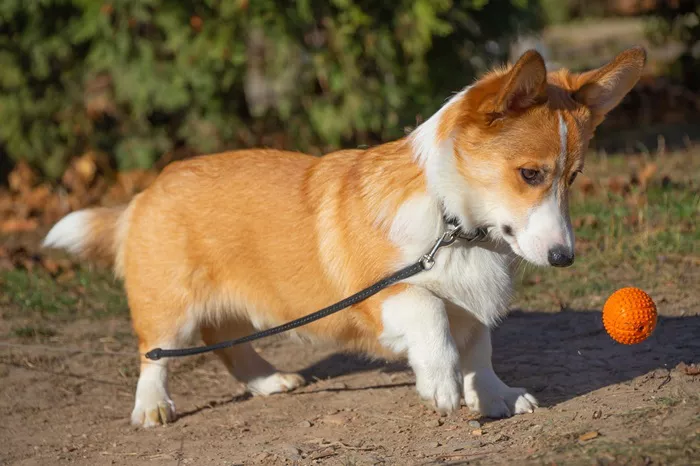The Corgi is a small, energetic, and intelligent breed. There are two main types: Pembroke Welsh Corgi and Cardigan Welsh Corgi. Both are known for their short legs, long bodies, and large ears. Originally bred for herding, they are loyal and highly trainable companions.
Temperament and Personality
Corgis are affectionate and alert. They are friendly but may be wary of strangers. They do well in homes where they get plenty of attention. Their playful nature makes them good with children and other pets.
Preparing for Your Corgi Puppy
Choosing the Right Breeder
Select a reputable breeder who provides health clearances. Avoid puppy mills. Ask to see the puppy’s parents and environment. A responsible breeder focuses on healthy temperament and genetics.
Puppy-Proofing Your Home
Remove wires and small objects. Install baby gates if needed. Keep cleaning supplies and chemicals out of reach. Provide a designated play and sleep area for your puppy.
Feeding and Nutrition
Feeding Schedule
Feed your Corgi puppy three to four times daily until six months of age. Afterward, switch to two meals a day. Use high-quality puppy food designed for small to medium breeds.
Nutritional Needs
Protein, fats, and essential vitamins are critical. Avoid feeding human food. Keep fresh water available at all times. Portion control is important as Corgis are prone to obesity.
Training Your Corgi Puppy
Start with Basic Commands
Begin training early. Teach basic commands like sit, stay, and come. Use positive reinforcement with treats and praise. Keep sessions short and consistent.
Socialization
Expose your Corgi to new sounds, people, and environments during the early weeks. This reduces fear and anxiety. Encourage positive interactions with other dogs.
Potty Training
Establish a regular potty routine. Take your puppy outside after meals, naps, and playtime. Praise them immediately after they eliminate in the right spot.
Exercise and Activity Needs
Daily Exercise
Corgis need regular activity to stay healthy. Two short walks and indoor play are usually sufficient. Avoid jumping from heights due to their long backs.
Mental Stimulation
Use puzzle toys, training games, and scent work to challenge their minds. Boredom can lead to destructive behaviors. Rotate toys weekly to maintain interest.
Grooming and Hygiene
Brushing and Shedding
Corgis shed heavily, especially during seasonal changes. Brush them at least three times per week. Use a de-shedding tool during high-shed periods.
Bathing and Nail Care
Bathe your Corgi every 4–6 weeks or as needed. Use dog-friendly shampoo. Trim their nails every 3–4 weeks. Long nails can affect their gait and comfort.
Dental and Ear Care
Brush your puppy’s teeth three times a week. Check and clean ears weekly to prevent infections. Look for redness or foul odors as signs of ear issues.
Health and Veterinary Care
Vaccinations and Checkups
Follow a vet-approved vaccination schedule. Routine checkups help detect problems early. Deworming and flea prevention are essential.
Common Health Issues
Corgis are prone to hip dysplasia, intervertebral disc disease (IVDD), and obesity. Regular exercise and a balanced diet help prevent these conditions.
Establishing a Routine
Feeding and Sleep Schedule
Set a consistent daily routine. Corgis thrive on structure. Regular meal times, walks, and sleep schedules build trust and confidence.
Crate Training
Crate training provides a safe space. It also aids in housebreaking. Make the crate cozy, and never use it for punishment. Keep it in a quiet area of the house.
Building a Bond with Your Puppy
Quality Time
Spend time playing, training, and cuddling. Corgis are people-oriented dogs. Affection strengthens your bond and builds trust.
Understanding Puppy Behavior
Expect chewing, biting, and bursts of energy. Redirect unwanted behaviors calmly. Be patient and consistent in correcting them.
Travel and Social Settings
Car Travel Safety
Use a pet seatbelt or crate in the car. Start with short drives. Bring water and take breaks during long trips. Keep your dog cool and comfortable.
Dog Parks and Public Spaces
Ensure your puppy is fully vaccinated before visiting parks. Supervise play and watch for signs of overstimulation. Respect other owners and clean up after your dog.
When to Seek Professional Help
Behavioral Issues
Seek help if your puppy shows aggression, excessive fear, or persistent barking. A certified trainer can assess and guide you.
Health Emergencies
Contact a vet if your puppy stops eating, has diarrhea, or acts lethargic. Puppies are vulnerable and can deteriorate quickly.
Conclusion
Raising a Corgi puppy is rewarding but requires commitment. Focus on consistent training, proper nutrition, socialization, and health care. These elements ensure your Corgi grows into a happy, well-behaved adult. Early efforts shape their lifelong behavior and well-being.
Remember, with love and guidance, your Corgi will become a loyal and joyful companion.
Related topics:
Can German Shepherds Eat Cheese? A Complete Guide
How to Groom a French Bulldog: A Beginner’s Guide
What is The Best Food for German Shepherd


